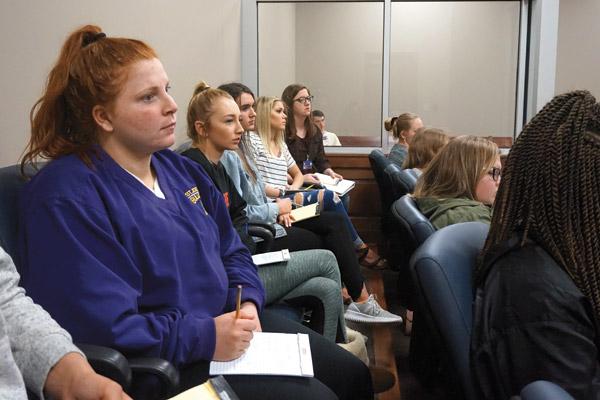

Chloe Kordsmeier jotted notes on a legal pad while a teenage defendant explained what led to an altercation with a much younger student. There were moments the writing stopped and all on the jury listened intently to the struggles of depression and hospitalization that plagued the life of the young man not far from their age.
In the American judicial system, being judged by a jury of your peers is a right. For juvenile defendants who choose to participate in the Faulkner County Teen Court, they are directly represented and judged by youth just like them.
Three seniors at St. Joseph High School in Conway are part of about 60 participating in Teen Court, a diversion program that allows low-level juvenile defendants, mostly first-time offenders, to be represented and judged by their teenage peers for a chance to “avoid the full range of penalty and the full juvenile court,” giving kids a chance to stay out of the system, said Faulkner County Juvenile Judge Troy B. Braswell Jr. The participants are prosecuting and defense attorneys, jury, clerk and bailiff, presiding over real juvenile court cases.
“I actually want to be an attorney so this is a great dip in the water to see how everything works in the court,” Kordsmeier, 18, said. “… Also just being there and knowing you’re making a difference in a kid’s life and knowing that maybe they’ll benefit from coming through Teen Court is a very good feeling.”
The program, running from January to May, caters to minor offenders who have pled guilty after being arrested for offenses, such as marijuana or alcohol possession, theft of property or some fighting incidents. Parents and teen offenders who agree to participate in Teen Court see about an 80-percent reduction in court costs and fines — court costs and fines normally can reach $1,000 — and their record immediately expunged, Braswell said.
“I think it’s important to have empathy and be able to understand someone who is going through a tough time … it allows the kids to relate to the juveniles better,” which allows for better outcomes, Braswell said.
Sentencing can include no more than six months’ probation, recommendations of a mentor, tutor, individual or family counseling, parenting, drug and alcohol classes, letters of apology, essays, community service or getting involved in a school or community club. After each case, the students and Braswell discuss why certain sentences were given.
“You see some things that happen in their life and you kind of feel bad and you know that through this experience that maybe you can help them,” said Kaitlyn Shockley, 17. “One of the things the Teen Court jury usually asks for is for the kid to get a mentor. You see kids that might not have the best home life, but you can try to improve that by giving them a mentor or get them into counseling.”
The students hear two cases twice a month and in between those cases, they shadow attorneys and meet with police officers, witnesses, the defendant and their family and anyone associated with the case and also learn about court proceedings and the importance of privacy. Students who know defendants are not allowed to oversee those court cases, Braswell said. Lawyers sit with the teens during the court cases offering advice if needed, but the teens lead the cases.
“I was a defense attorney. You meet the kid, you sit down with them; you’re paired with an actual lawyer who helps talk you through a case, and it’s really interesting to see the events in their life, what led them to that point,” said 18-year-old Michael Frost. “Part of the Teen Court process is … what steps can you take to make sure they don’t do this in the future and it’s really exciting to be a part of that to try to make that difference.”
Teen Court was implemented in Faulkner County in 2008 by then-circuit judge Rhonda Wood, now an associate justice on the Arkansas Supreme Court. It ended in 2013 but when Braswell was appointed in January 2015 he decided to not only revive the program, but oversee it.
The Arkansas Teen Court Association was established with a $1,000 grant from the National Association of Youth Courts in 2009. About six Teen Courts operate in Arkansas, but Braswell is the only juvenile court judge to preside over one.
“I wanted to turn to the community and say, ‘Why don’t you come here and help me.’ Give an opportunity to make a difference in someone else’s life,” he said.
Last fall, Braswell recruited seniors from Conway, Greenbrier, Mount Vernon-Enola, Mayflower and Vilonia.
“I’m looking for students who have had real-life experiences, that have overcome adversity and students that display good leadership skills. Sometimes that fits to the 3.5 GPA student; sometimes it’s a 2.5 GPA student,” Braswell said. “I want a good cross section of our youth.”
It is the first time since the program was re-implemented that St. Joseph students have participated.
“By getting them out there and seeing what’s going on in the community and what’s going on with other students in our county, I think it’s a real eye opener for them,” said St. Joseph High School principal Diane Wolfe.
Shockley said she enjoyed talking to the defendants, but there were times when some wouldn’t open up. In one case, she said, “Whenever you would ask him questions about his home life he didn’t want to share, but you could tell there was something going on.”
Most defendants range from 12 to 15 years old, something that Kordsmeier said was the biggest shock.
“I think that’s what really surprised me is how young kids are that are getting in trouble with the law already and you just really think about it and hope that they learn from this experience,” she said.
Braswell said he’s seen many instances where the participants can offer encouragement to the defendants.
“I had a juvenile defendant that had previously attempted suicide and was having some pretty difficult issues at school,” Braswell said. After the teens heard the case, one student asked to speak, saying in part, “I’ve been through what you’ve been through, I’ve walked in your shoes, I have had those experiences. You can get through this and do whatever it is you want to do.”
“I can tell kids that, but to hear it from someone who has been picked on and harassed and be able to push through, that ‘don’t give up hope,’ that’s why we do it,” he said.
For the St. Joseph students, it’s another way to live out their Catholic faith.
“We’re called to help others who maybe cannot help themselves. Some kids come from a very rough home life or come from a different family dynamic than I’m used to, so knowing that maybe you can change them and help them is very fulfilling,” Kordsmeier said.
Please read our Comments Policy before posting.
Article comments powered by Disqus Shannon Trantina: Putting away anxious thoughts
Shannon Trantina: Putting away anxious thoughts
 Senior class could count on Kendall Fillippino in Conway
Senior class could count on Kendall Fillippino in Conway
 Conway’s Lady Bulldogs claim 2A state golf tournament
Conway’s Lady Bulldogs claim 2A state golf tournament
 $9.5 million high school building in Conway now open
$9.5 million high school building in Conway now open
 Conway senior’s conversion influenced his entire family
Conway senior’s conversion influenced his entire family
 Studio 3:16 offers new approach to teaching religion
Studio 3:16 offers new approach to teaching religion
 After three decades, NLR principal plans to retire
After three decades, NLR principal plans to retire
 CHS athlete overcomes odds to reach collegiate goal
CHS athlete overcomes odds to reach collegiate goal
 John Calipari: UA basketball coach and devout Catholic
John Calipari: UA basketball coach and devout Catholic
 'Cabrini' film tells story of saint with great faith
'Cabrini' film tells story of saint with great faith
 St. Joseph a model of solidarity with immigrants
St. Joseph a model of solidarity with immigrants
 Two gifts after Jesus’ death: Virgin Mary and Eucharist
Two gifts after Jesus’ death: Virgin Mary and Eucharist
 Why we have an altar, and not just a communion table
Why we have an altar, and not just a communion table
 Pope: Wars should be resolved through nonviolence
Pope: Wars should be resolved through nonviolence
 Living relationship with Jesus Christ in the Eucharist
Living relationship with Jesus Christ in the Eucharist